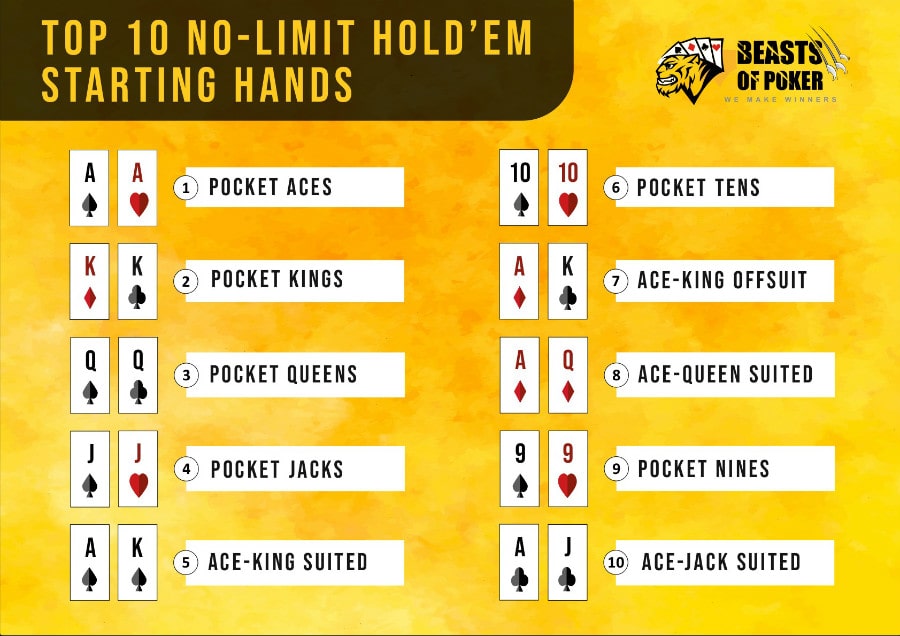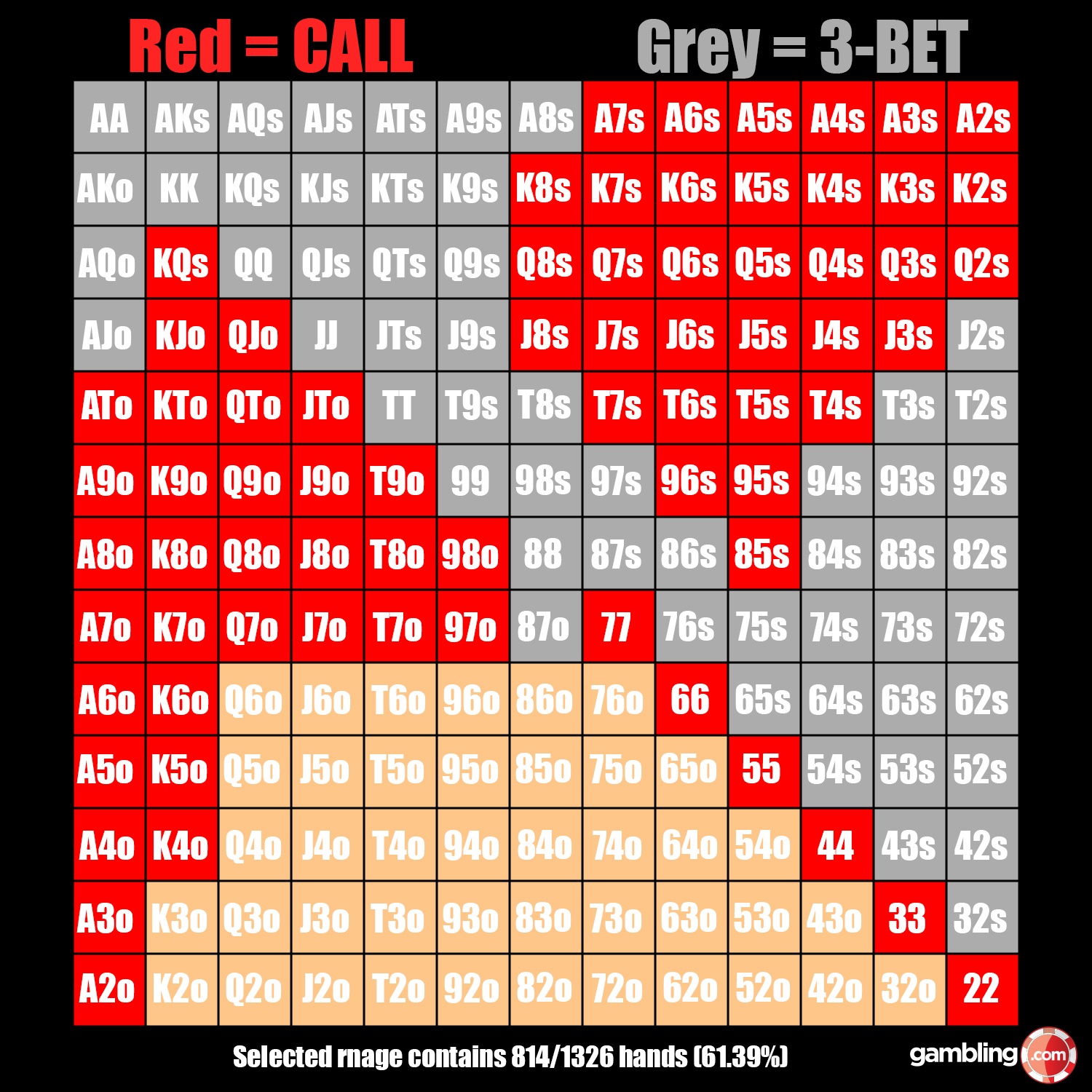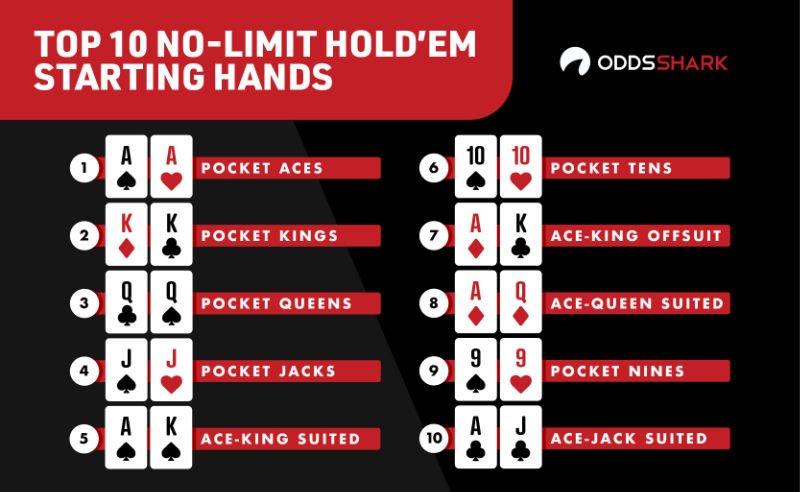What Are Good Hands In Texas Holdem

- What Is A Good Hand In Texas Holdem Poker
- What Is A Good Hand In Texas Holdem
- What Are Good Starting Hands In Texas Holdem
- What Are Good Hands To Play In Texas Holdem
- What Are Good Hands In Texas Hold'em
Playable Texas Hold’em Hands. Texas Hold’em is a game of strategy, like any poker game, but where you’re sitting in relation to the action becomes part of your strategy when playing Hold’em. If you bet early, you generally need better cards than you do if you’re one of the blinds. The above 3 sets of hands add up to form the common answer of 169 Texas Hold’em starting hands There are actually 1,326 combinations of starting hands if you count suits (e.g. A♣- A♦ and A♠- A♥ are different hands), but that is more of a “just for fun” number as suits have no value over each other in Texas Hold’em.
- My #1 Texas Holdem tip is one of the very first lessons in poker that any beginner needs to learn. And that is, you need to play good poker hands in order to win. The number one reason why many amateurs lose at Texas Holdem is because they play way too many trashy hands!
- These two starting hands are the major players in hold’em. It’s not often you’ll get dealt Aces or Kings. In fact you get either Aces or Kings once in every 110 hands, so it’s not nearly as often as we’d like. Aces are by far the best possible starting hand in hold’em, closely followed by Kings. However, you should be aware that.
- General Guidelines
- Seven Card Stud
- Limit Texas Hold'em
Because of the community cards, Texas hold ’em can produce some unusual hands, and many combinations can be out. So if you fail to pay attention to the board and the prior action, you might mistakenly think you have the winner, when in fact, several other players easily can be holding better hands.
Here’s an example. Suppose the board is the
and you hold the
Although you have top pair, which is often a winning hand, if you are against someone who holds the
he will beat you with two pair.
If another player has the
his trips will beat the two pair. In addition, three possible straights can be out. So if another opponent holds the
another has the
and still another has the
then all of these hands will beat the three tens, but the ace-high straight is, of course, better than the other two. And finally, if someone plays the
he will win the pot with a spade flush.
Incidentally, you normally shouldn’t play a hand like 8[spade]3[spade]. But some people do, and this is one of the variables that makes the games good. You also must remember that situations like the one just described do occur, and sometimes you have to throw away a good hand.

Spread Limit Strategy Changes
The two primary strategy changes provided for spread-limit seven-card stud games are also appropriate for Texas hold ’em games played with spread limits. That is, first of all, you often can see the flop cheaply. This means that you should play a few more hands for the minimum amount, which in a typical $1-$4-$8 hold ’em game is either $1 or $2. Again, you should consider your position before entering the pot, and if an opponent raises after you have called the blind, you usually should throw away a weak hand.
And second, if you have a good starting hand, you want some competition. So here again, you usually shouldn’t raise the maximum before the flop if no one has yet voluntarily entered the pot. Winning only the blind(s) when you hold pocket kings is not your objective.
Selected Odds
As already pointed out, it’s not essential to know the exact odds but only to have a general idea of what your chances are in a particular situation. So like the odds furnished for seven-card stud, those that follow for Texas hold ’em are provided primarily for their interest alone
| Starting Hand | Odds |
|---|---|
| A Pair of Aces | 220-to-1 |
| Any Pair | 16-to-1 |
| Two Suited Cards Ten or Higher | 32-to-1 |
| Two Unsuited Cards Ten or Higher | 10-to-1 |
Other Odds of Interest
● If you start with two suited cards, the odds against flopping a flush are 118-to-1, while the odds against flopping two flush cards are 8.1-to-1.
● If you flop a four flush, the odds against completing your flush are 1.9-to-1.
● If you start with a pair, the odds against flopping three of a kind are 7.5-to-1.
● If you start with cards of two different ranks, the odds against flopping one pair are 2.1-to-1, the odds against flopping two pair are 48-to-1, and the odds against flopping three of a kind are 73-to-1.
Poker Strategy and Other Topics - November 2019
by Carlos Welch
by Robert Samuels
by Kevin Haney
by Kevin Haney
by Ben Saxton
by Bryan Clark
by Felipe Garcia, CFA and Aaron Byrd, CFA
by Nick Willett
by Mason Malmuth
Texas Hold’em poker is everywhere these days — on TV, online, and in clubs and casinos. Before you sit down to a game of Texas Hold ’em, make sure you’re in good shape to be successful — take care of non-poker issues and check your physical, mental, and financial status. During the game, you need to understand basic odds and playable hands, as well as how to bluff successfully and follow proper poker etiquette. Texas Hold ‘Em also has its own abbreviations for online play.
Playable Texas Hold’em Hands
Texas Hold’em is a game of strategy, like any poker game, but where you’re sitting in relation to the action becomes part of your strategy when playing Hold’em. If you bet early, you generally need better cards than you do if you’re one of the blinds. The following table offers sound advice on what hands are playable when you’re sitting in different positions.
What Is A Good Hand In Texas Holdem Poker


Questions to Ask Yourself before You Play Texas Hold’em
Whether you’re playing Texas Hold’em for fun or money — make that whether you’re playing for high stakes or low stakes — make sure you’re in a position mentally, physically, and financially to enjoy the game and make the most of your chances. Ask yourself these questions before you sit down to a game:
What is the purpose of my playing this session? Whether it’s to learn more, win money, or just hang with friends for a good time, make sure you know why you’re there and that you’re doing everything you can to accomplish that goal.
If I were to play an opponent who’s exactly the same as a well-rested, un-stressed version of me, would that person have an advantage? If the answer is “yes,” hold off on playing until you’re in a better psychological and physical state.
Can my bankroll handle this level of play? If not, play a lower level.
Are there any distractions in my life that I need to get rid of before I play? Pay your rent, walk your dog, call your significant other — whatever it is, get it out of your head so you can focus.
Do I know if the house I’m playing in has any bonuses for players such as bad beat jackpots, high hands, free food and/or drinks for players, or freeroll tournaments? If not, ask a floorperson before you start playing and find out about the details of how you can qualify.
Is there an aggressive person at the table I’ll be playing at? If so, try to get yourself seated to his left so you see the raises before your action and not after.
What do I know about the people sitting at the table? Whatever it is, use it to your advantage.
Rough Odds for Texas Hold’em
Playing poker is about playing the odds. The following list gives the odds for outcomes in Texas Hold’em hands. When you realize how heavily the odds are stacked against you, you may want to rethink going all-in before the flop with two suited cards. Use the odds to your advantage:
1 percent (1-in-100): Percentage of time that no player holds an Ace or a King at a table in a 10-handed game
1 percent (1-in-100): Percentage of time that if you hold two suited cards, you’ll flop a flush
6 percent (about 1-in-20): Percentage of time that five community cards will give pocket suited cards a flush
6 percent (about 1-in-20): Percentage of time that you’ll be dealt a pocket pair
8 percent (about 1-in-12): Percentage of time that you’ll hit at least trips after having a pair on the flop
12 percent (about 1-in-8): Percentage of time that you’ll flop trips if holding a pocket pair
12 percent (about 1-in-8): Percentage of time that two more cards will flop in the same suit as a suited pocket pair
19 percent (about 1-in-5): Percentage of time that the five community cards will at least trip your pocket pair
32 percent (about 1-in-3): Percentage of time that you’ll pair one of your cards on the flop (with no pocket pair)
33 percent (about 1-in-3): Percentage of time that you’ll make a full house or better after having trips on the flop
35 percent (about 1-in-3): Percentage of time that you’ll make a flush on the turn or river if you have four cards to a flush after the flop
Texas Hold’em Bluffing Tips
What makes any poker game exciting, and Texas Hold’em is certainly no exception, is that players can bluff at any point. Sometimes half the fun of a game is seeing whether you can successfully bluff an opponent out of some money. But, even as you’re misleading your opponents, make sure you bluff in the right circumstances. Heed these bluffing tips:
Only bluff where it makes a difference to your standing — either in a tournament or to your stack of chips.
Be careful bluffing someone considerably worse than you are. He may call just to see what you have, or on some probabilistically low draw when he already has you beaten anyway.
Bluff in situations where the board hints at the great hand you do not have: straights and flushes being hinted at by the board, the turn of an Ace, and so on.
Don’t try to bluff players who only play the most solid of hands if they’re still in the pot.
Don’t bluff people who are extremely likely to call.
Do bluff the timid or people who are likely to fold.
Remember that it’s easier to bluff in No-Limit than Limit because the bets (both implied and real) are bigger.
Poker Etiquette for Texas Hold’em
The etiquette tips in the following list apply to Texas Hold’em and to any other poker game. Sure, you can have fun while you play poker, but you can have all the fun you want without being impolite to the other players or the dealer. Basic poker etiquette includes these tips:
What Is A Good Hand In Texas Holdem
Always play in turn.
Be aware of when it’s your turn to post the blinds and do so promptly.
Any time there is a discrepancy at the table, talk to the dealer — not the other players — about it. If you’re not able to get satisfaction from the dealer, ask for a floorperson. Talking with other players about the problem you perceive may generate ill will among people who have no authority in the situation in the first place.
Place your bets in front of you. Do not splash them into the pot.
Do not show your hand to other players at the table while a hand is in progress.
Tell the dealer when you intend to raise. In No-Limit, gather the amount that you’re going to raise and either announce the total, or move it all forward with one motion. This prevents being called on a “string raise.”
Don’t forget to tip your dealer. Dealers work for minimum wage and rely on tips for their livelihood.
What Are Good Starting Hands In Texas Holdem
Online Poker Abbreviations for Texas Hold’em

What Are Good Hands To Play In Texas Holdem
Playing online poker in general, and Texas Hold’em in particular, is a very popular pastime. When you’re online, you may encounter abbreviations specific to the world of poker. To understand what other players are saying, get familiar with these online abbreviations:
What Are Good Hands In Texas Hold'em
| Abbreviation | What It Means | Abbreviation | What It Means |
|---|---|---|---|
| 86 | To remove or ban | ne1 | Anyone |
| brb | Be right back | nh | Nice hand |
| gc/nc | Slightly sarcastic phrase meaning good catch/nice catch | gg | Good game |
| lol | Laughing out loud | gl | Good luck |
| nl | No-Limit | ty | Thank you |
| n1 | Nice one | 🙂 | Smiley face (view sideways) |